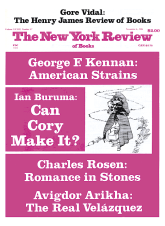In response to:
Visiting Malraux and Nabokov from the August 14, 1986 issue
To the Editors:
The excerpts from the diaries of Edmund Wilson [NYR, August 14] contain some discussion between Wilson and Malraux on the subject of Alexis Léger, better known as the poet Saint-John Perse (Nobel Prize in Literature, 1960). As we approach the poet’s centenary in 1987 it seems all the more fitting to correct some errors of assertion in the Wilson piece.
As to the (mis)estimation by both men of Perse’s work, the informed reader is free to judge. My own view is that Perse’s work is a continuous challenge and source of great pleasure. His poem Vents is as likely to last as any written in this century.
More serious is the gossipy assertion by Malraux of Léger’s supposed Pétainism (or collaborationist tendency). This is both dangerous and wrong. Alexis Léger was the permanent undersecretary of Foreign Affairs from 1931 to 1939. Far from being a fascist, Léger was an outspoken anti-Nazi who paid dearly for his opposition to Hitler. With the fall of France imminent, Léger chose the route of exile, first in England and then in this country. The Pétain government stripped him of his ambassador’s rank, his Légion d’Honneur, and his citizenship. The Gestapo seized his personal possessions and his financial assets.
In Washington, Léger became a close personal friend of Roosevelt’s attorney general, Francis Biddle. Léger wrote often of his admiration for Roosevelt’s style of what he called social democracy. During the war, General De Gaulle several times invited Léger to take part in the government in exile. Léger declined, largely because he felt—and this is my interpretation based on their published letters—that De Gaulle would assume power in France illegitimately following an Allied victory.
The danger in publishing literary gossip of this sort is that the reputations of writers of great achievement can be tarnished, their personal integrity assailed, and no one is truly accountable for the damage done.
Peter Baker
Southern Connecticut State University
New Haven, Connecticut
This Issue
November 6, 1986



